I was having fun with Borodinsky so I ploughed ahead with a black rye (not bad) and a Franconia and Auvergne from ryebaker.com. I'm pretty bummed by the results, particularly as I spent a lot of time sprouting, drying, milling rye and spelt flour.
I made a few steps that caused me problems:
- I got very focused on one thing (sprouting, drying, and milling a bunch of rye and spelt) and I tired myself out.
- I wanted to scald all that bran to soften it up but went with the recipe the first time... Franconia had a bit of bran chew my wife said she liked... I might prefer softer... with the subsequent Auvergne I didn't sift out the bran for the last stage because I was tired out and trying to make breakfast for two at the same time. It also had a bit of a bran chew to it
- I tried reducing water and fermenting time to improve gluten control in Auvergne but it didn't seem to help
- I followed the temperature and times for Auvergne but it overbaked the crust (inside was still nice and moist)
Challenges and Options
- I can't seem to develop the dough very much... remains clayish
- I think sifting and scalding or soaking the bran would help, then integrate it with the dough
- I wonder if autolysing the non rye flour and developing its gluten first then mixing it into the rye and sponge might work better
- I don't really understand the complex baking steps for Auvergne... seems like a lot of heat for a long time. I would be tempted to cut 15 mins (5 mins per phase)
Franconia
Shaped loaves... but dough is more like the Borodinsky. No gluten strength. Had to handle with wet hands.
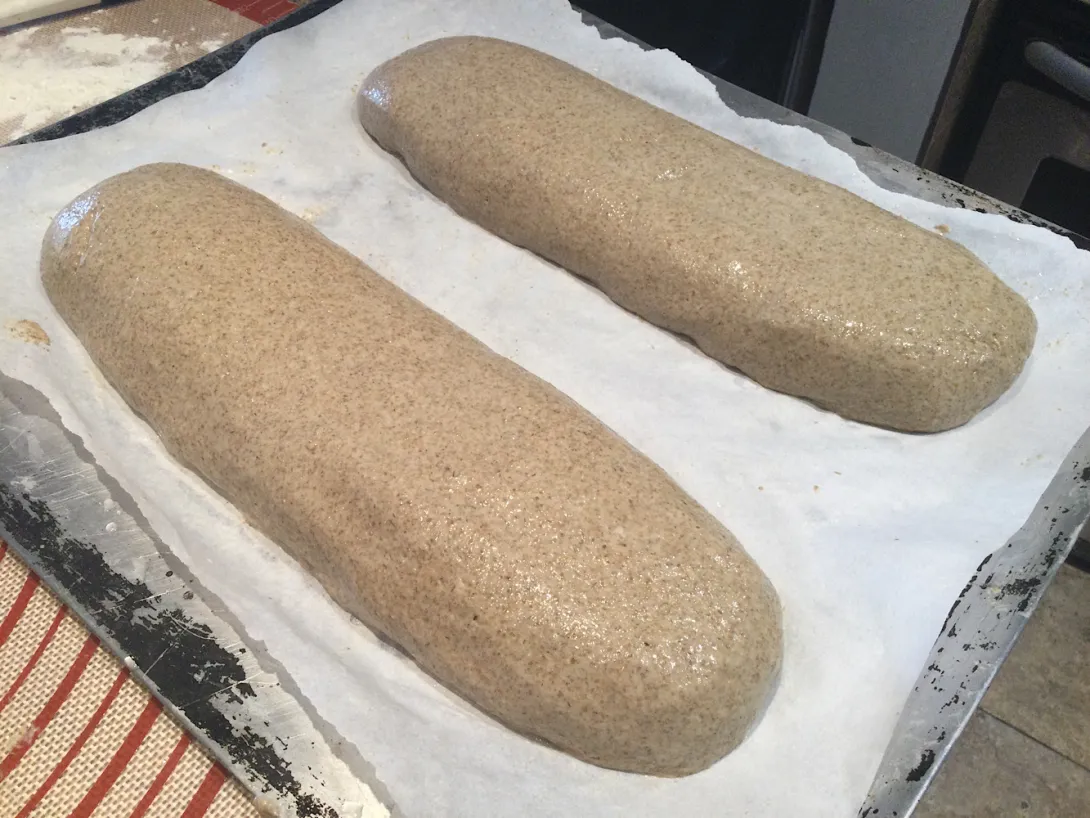
They spread out...
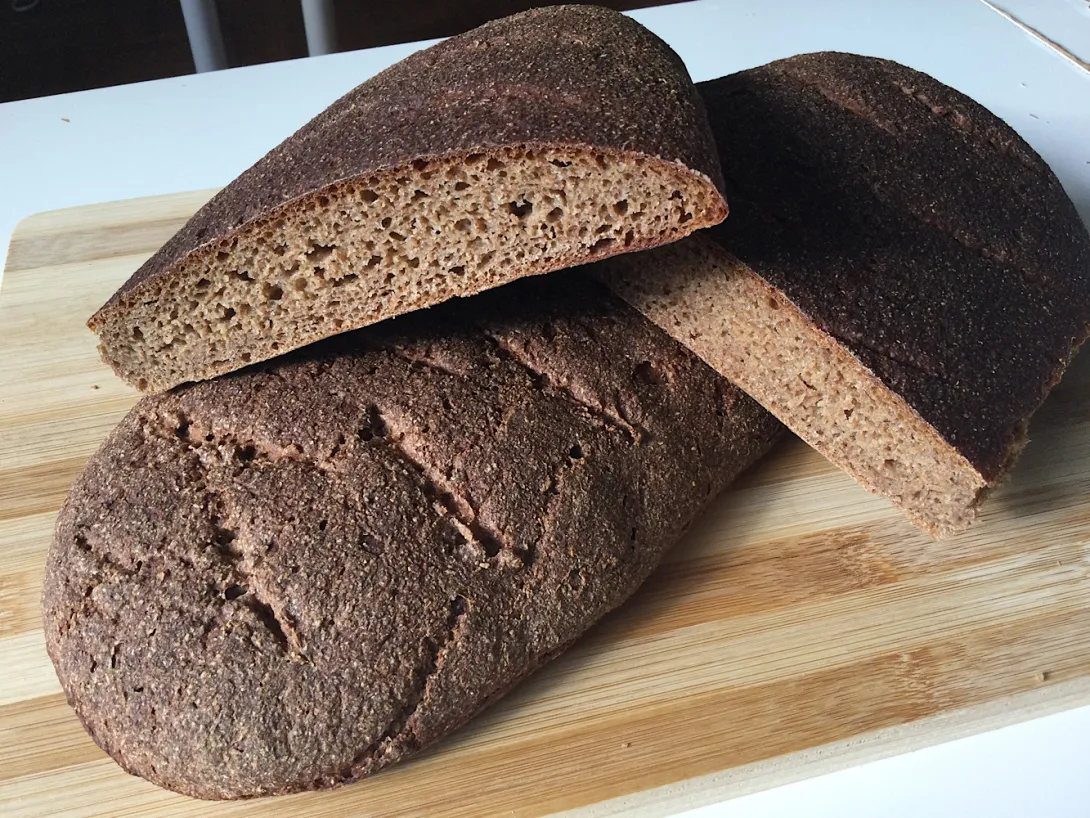
Firm slices, moist with a bit of grainy chewiness from bran but also a creaminess that I attribute to the fresh milled spelt. "Bread spices" are forward (fennel, star anise, caraway, coriander) with more anise upfront and caraway lasts the longest. Hint of sour. I look forward to tasting more of this toasted with butter or with cheese and prosciutto.
Auvergne
So much sprouting, drying and milling for this one. Sigh. Same issue with clay like dough. So I gave in and shaped it with wet hands and put it in pans. Ryebaker baked it as 2 boules.
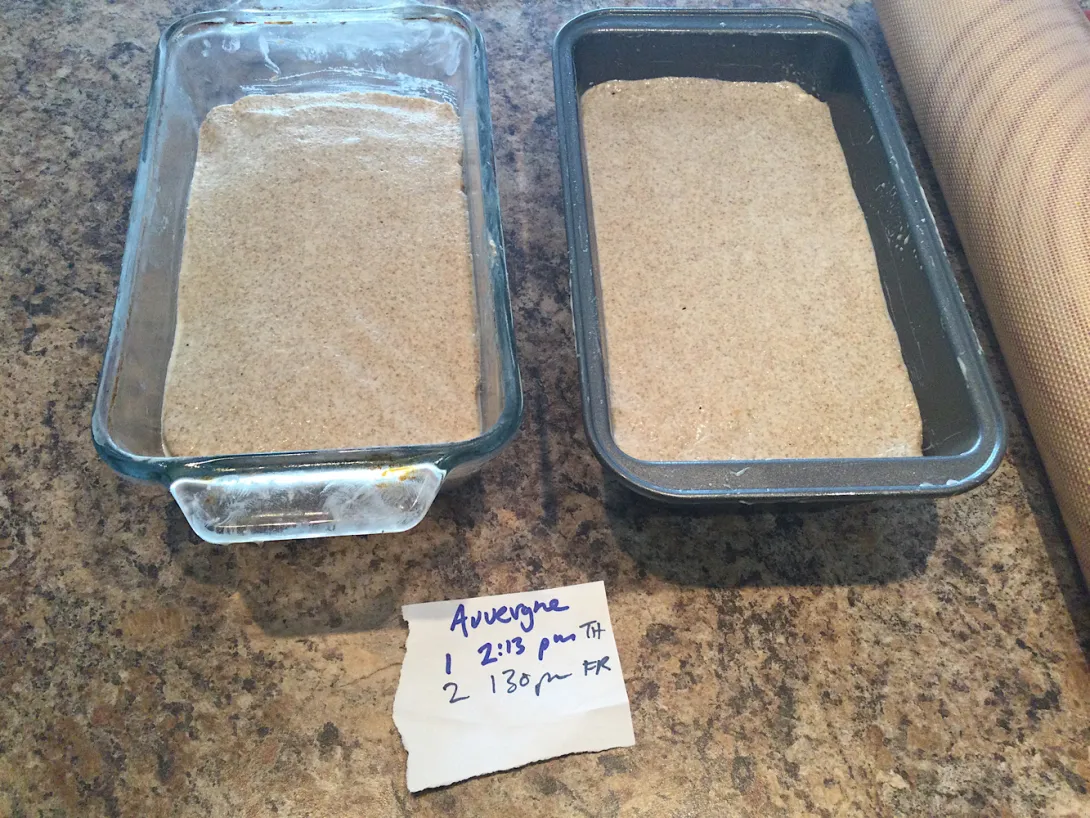
It rose nicely and I cut the fermentation short by a half hour to avoid going too far.
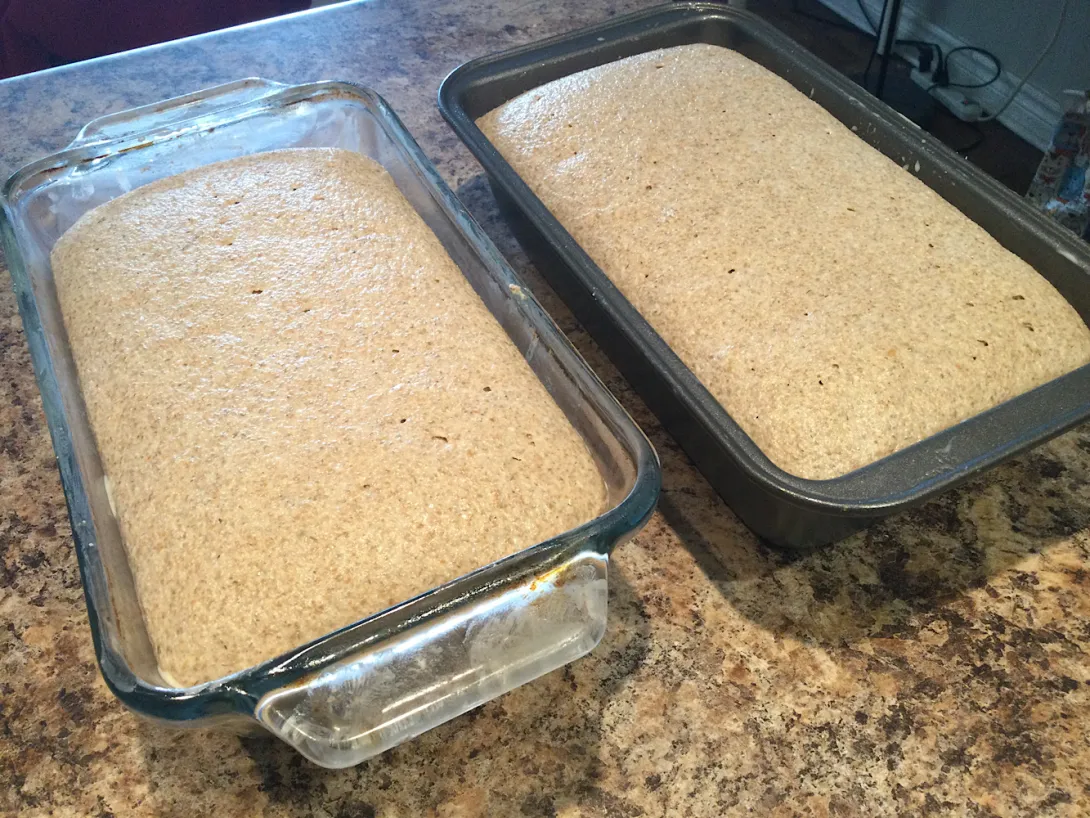
Blah... These are overbaked. Crust is quite crisp (will probably soften once put into bags). Should've been watching to check its progress but I was tired and watching a chocolate making show on Netflix :p
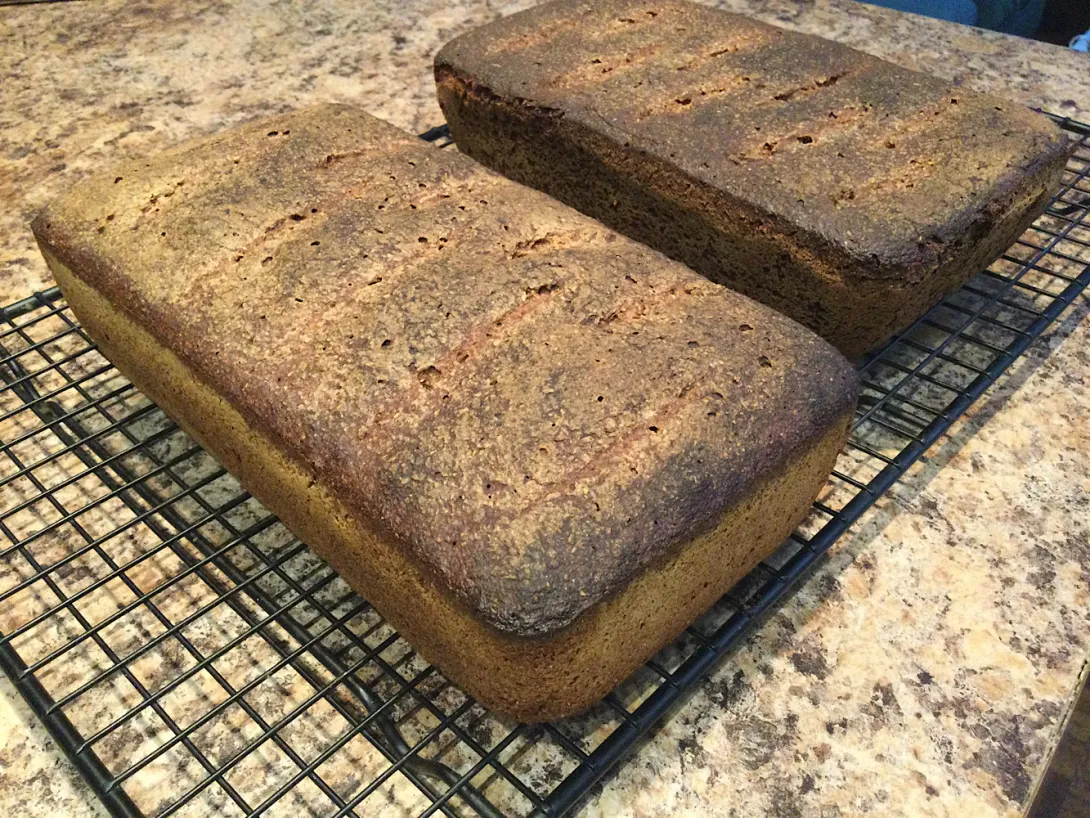
Crumb turned out ok and it's moist inside. It's sliceable.
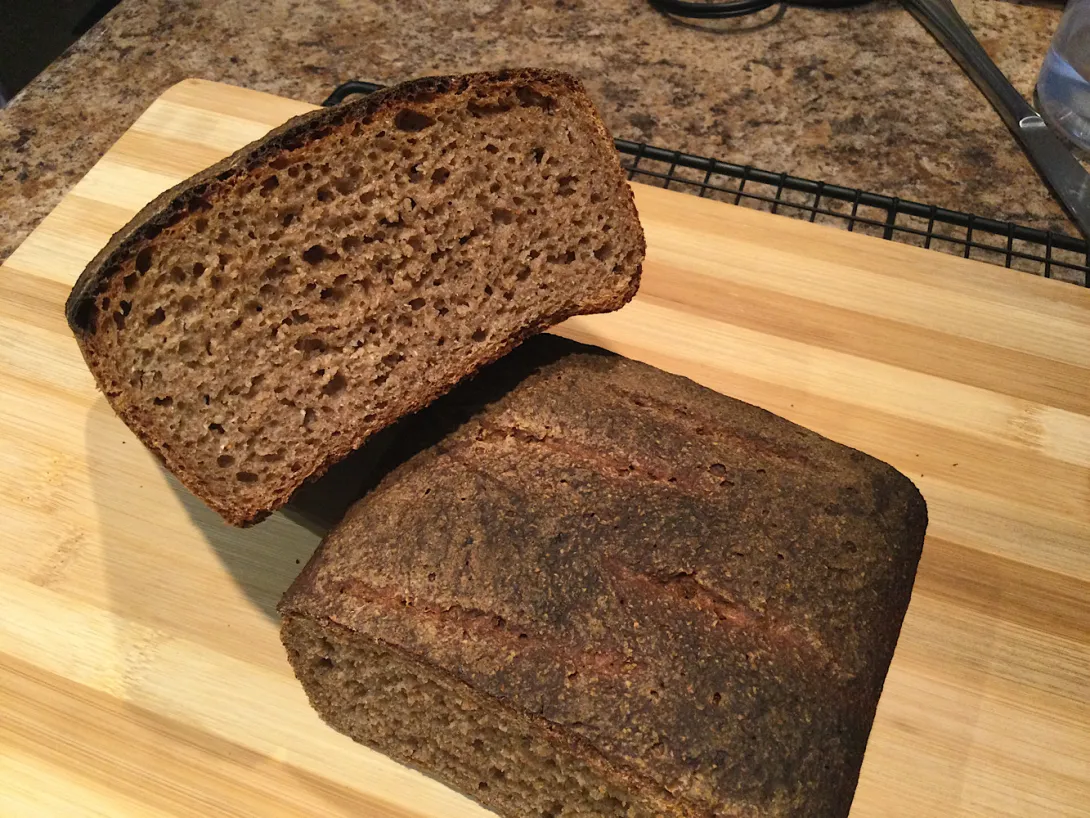
It's only been a few hours so it's too early to tell but a brief taste was a mild sour and... not a whole lot else. It didn't taste like the effort I put into it at least right now. I had expected creaminess due to the large amount of spelt, but not there right now. But it may be better tomorrow.
Conclusions
My instincts said to scald bran but I went with the recipe first. In the future, I would scald.
In terms of effort and result, Borodinsky seems to have the most payoff to me.
However, I have been slicing and freezing my black rye, franconia, and auvergne to be eaten during the holiday break. So maybe freezing, toasting and toppings will reveal more.
- happycat's Blog
- Log in or register to post comments
Crumb looks good. Haven't tried Franconia so cannot comment. The Auvergne should have quite a complex flavour but I don't remember there being any spelt in it. Don't know about you but when I buy rye it's sold as wholegrain or white rye. Some recipes work out great the others not so much. If you have a look at his page on different types of rye, and the types of rye called for in the recipes, there seem to be many va-rye-ites (apologies - couldn't help myself). When opening the seemingly two types of rye available to me I do see differences. Some are darker, others are finer etc. I'm thinking that when it turns out well i've stumbled on the correct rye and when it doesn't I like to think it's partly due to not buying the right type of rye. I've never seen rye sold as the many different types of varieties he describes.
Two ideas for rye which hasn't turned out as nice as you'd like.
1: Save some to make a bread soaker for your next bake.
2: Use it to make Kvass.
Thanks. Both specified "whole rye" which I believe I made by grinding rye.
The bread is definitely worth eating but keeping some for an altus is a great suggestion.
I had kvass from a Polish market once.. interesting but I couldn't finish it. I think it was a psychological barrier to drink rye bread.
Nothing worse than spending a lot of time on a bake, carefully following it to the letter, only to be let down by the result. I've been there.
Then you have to make the decision whether to regroup and go for mk II and perhaps mk III or call it a do.
I guess we mostly don't like to be beaten though!
Lance
You got that right for sure. I'm tempted to focus on improving my Borodinskys unless I am really missing something with these other recipes.
David I can totally relate to your disappointment even though I haven’t made any breads as involved in process and time and skill as your breads so I can imagine your disappointment is great. That being said, I wouldn’t be surprised if you liked the flavour of both better tomorrow or the next day once they have had more time to cure.
Do you think you will give either of these another chance using your instincts rather than following the recipes as written? I hate when a recipe gets the better of me, and I suspect you’re like that as well like so many bakers.
Benny
Well you're probably right. I'll probably keep wondering about the tweaks. I keep thinking about the bran... there just isn't enough time to soften up the large amounts of flour added at the end.
If my ideas improved anything I would certainly learn something from it.
If I were smart, I would test recipes using storebought flour, then move up to hand milled once I had mastered the recipe :p
I got too ambitious and overextended.
Your steady mastery of Hokkaido milk bread is a good example of a pathway!
Arg. Should have read the comments on ryebaker.com under the Seigle Auvergne recipe where several people said it baked too long and the crust was quite hard. Ryebaker himself said the crust was supposed to be dark and hard. Hm. o.k.
Looks like I just rediscovered issues that were already known.
David I didn’t remember that the Auvergne is also known as the Tourte de Seigle which I’d actually also baked the Stanley Ginsberg version. Of course my version was the simple store bought version with Bulk Barn whole rye. I think I overproofed somewhat and I have to say that I wasn’t excited about the flavour and haven’t gone back to baking 100% rye again since that bake. The flavour was just underwhelming, but of course, that might have been my flour or my bake of that bread. Perhaps that recipe just isn’t great? That might be sacrilege to say though since Stanley Ginsberg obviously is an expert rye baker, or it may be that I may not love 100% rye.
Benny
Thanks very much for that followup note. You're a skilled baker so I think it's more likely the recipe isn't properly kitchen tested and tasted with a sample from the target audience.
There are many complaints about errors in the book and requests for an errata. I have no doubt it was a monumental effort to write, but I also know from experience that nothing can be trusted without testing it with a target audience in the "real world" to surface errors and assumptions about knowledge, equipment, environmental condtions, and ingredients.
The ryebaker himself admits in a comment that he revised the timing without testing it.
I did a bunch of further reading on rye and it seems my experiences (in general) are common. So it's worth playing with my ideas I guess to see how they might help things for me and perhaps others.
Your loaves look pretty good; definitely NOT fails. I would be happy with those outcomes.
I baked the version of the Auvergne Rye from Ginsberg's book. My experience was much the same as yours: the dough spread in the proof to give me more of a UFO loaf. Part of my problem may be that I mix the dough by hand instead of using a stand mixer. Despite the shape, I thought the flavor was OK.
I also baked the Franconia Rye from theryebaker.com. Again, my experience was much the same as yours—the dough spread in the proof. Flavor was good. I especially like the bread spice, but I used anise instead of star anise.
I also tried the Provençal Rye from his book. This one definitely had a major error in that the sponge was built with 100 g of rye sour culture instead of what I think should be 10 g. This bread had an odd taste probably from the wrong amount of culture. I have made other recipes from the book and they have generally given good results. I especially liked the Valais Rye, Caraway Beer Rye, and Paderborn Rye. But I agree that an errata would be helpful.
Very helpful, thanks for the info and all those pix (with a ruler to show the spread!) I love the colour of your loaves.
I ate the Auvergne today sliced and toasted with mayo, prosciutto, parmesan and tomato. It was a decent base and stood up well to the toppings and the chew worked fine for that. On its own, didn't wow me.
I am amazed you can mix by hand. It was quite a stiff, claylike dough for me. Is there a particular technique you used? On TFL old posts I see some people say you can't really develop anything in rye, just mix it thoroughly then stop to avoid damaging pentosans.
What do you think about the idea of:
1. sifting out all rye and non rye bran and scalding it separately to protect structure in the developed dough (or for recipes using a long or intense scald, bias the bran to that portion of flour)
2. autolysing any non rye flour separately to develop gluten
3. then combining the sponge, scald and leaven (each kind of optimized on its own)?
Yeah, mixing rye by hand is a challenge. I scale the larger recipes rye to ≈1000 g because the bread won’t be consumed fast enough and my freezer space is limited. Even so, 1 kg of rye dough is still tough by hand and I’m not sure I develop the dough enough. I have wondered if that is why my loaves spread more than the recipes show. I do have a mixer (Bosch Compact) now and I’m curious to see if it makes a difference. I actually would rather bake in a Pullman pan because it’s perfect for sandwiches.
I really can’t comment on your ideas because I don’t have enough experience with bread and how those factors contribute. But they seem reasonable. I’m lazy— I don’t have a grain mill or sieves—so I’m not making my own malt or sprouted grains or milling my own flour.
I think for high % rye, pan is the way to go. Simple & results in a decent geometry. Online pix of high % rye loaves seem pretty misleading unless they show a cross section without getting too close to lose scale... then it's clear how thin they are.
Overrferment and overproof could be issues but rye just doesn't have usable gluten. Spiking with yeast would puff it up more I guess and ryebaker does that with a bunch of recipes.
You can get very tall profiles on hearth rye loaves. They need to have significantly lower hydration than when baking in a pan, so they don't spread out. Proof in some kind of vessel on a towel or couche. Wet the surface before baking, bake in a very hot oven on a very hot stone the first few minutes. Can dock first with a thin stick to prevent cracking and separation of the crust. Check out my blog for examples, or Rus Brot youtube channel for lots more (he has a separate playlist with subtitles in English, and has a useful blog). These rye breads look so beautiful, I kinda stopped using my pans and really strive to achieve the smooth shiny dark but soft crust. Not always very successfully, but more so than not with more experience.
My Auvergne rye was a much bigger failure than yours, this one looks good!
Ilya thanks for those tips.
I was wondering about reducing hydration (I tried it with the Auvergne but just 10% for the last big 350g water add-in --probably not enough overall given the large sponges).
I will look at your blog and Rus Brot. Having gained some hands-on experience I think I'll benefit more from studying now.
I think even our fails taste better than store bought bread (especially with toppings) so it's all relative :) Sometimes I buy something and it's so bland it helps me appreciate home baking again.